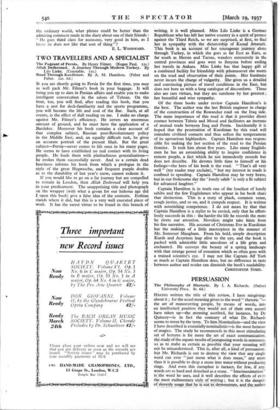TWO TRAVELLERS AND A SPECIALIST
The Pageant of Persia. By Henry Filmer. (Kegan Paul. 15s.) Allah Dethroned. A Journey Through Modern Turkey. By Lilo Linke. (Constable. 15s.) Road Through Kurdistan. By A. M. Hamilton. (Faber and Faber. 12s. 6d.) Jr you are shortly going to Persia for the first time, you may as well pack Mr. Filmer's book in your baggage. It will bring you up to date in Persian affairs and enable you to make intelligent conversation in the salons of Tehran. On the
boat, too, you will find, after reading this book, that you have a zest for deck-familiarity and the sports programme, you will become the life and soul of the Bar. Such, at all
events, is the effect of dull reading on me. I make no charge against Mr. Filmer's efficiency. He covers an enormous
amount of ground, and he must have the application of a Baedeker. Moreover his book contains a clear account of that complex subject, Russian post-Revolutionary policy in the Middle East, and, an equally difficult task, he gives an accurate portrait of the present Shah. But the great subject—Persia—never comes to life once in his many pages.
He seems to have established no real contact with its living people. He loads them with platitudinous generalisations—
he evokes them successfully never. And so a certain dead heaviness informs his book from which a prologue in the
style of the great Hogwasche, and frequent purple doubts as to the durability of last year's snow, cannot redeem it. If you would like to go on a far journey but are compelled to remain in London, then Allah Dethroned will help you
in your predicament. The unappetising title and photograph on the wrapper (with what a groan for our hideous age did I open this book) give a false idea of the contents. Eothian stands where it did, but this is a very well executed piece of work. It has the rarest virtue to be found in this branch of
writing, it is well planned. Miss Lilo Linke is a German Republican who has left her native country in a spirit of protest against the Third Reich, so we are surprised, at first, to find her in sympathy with the dictatorship of Kamal Attaturk. This book is an account of her courageous journey alone through Turkey, in which she goes as far East as Kars, as far south as Mersin and Tarsus, wanders extensively in the central provinces and goes west to Smyrna before ending her travels in Ankara. Miss Linke has that happy gift of a combined facility for friendship with whomsoever she meets on the road and observation of their points. Her frankness never incurs the charge of vulgarity. She- gives us a detailed and convincing picture of travel conditions in the East, but does not bore us with a long catalogue of discomforts. These also are rare virtues, but they are outshone by her greatest : her beautiful and wise sympathy.
Of the three books under review Captain Hamilton's is the best. The author was the last British engineer in charge of the construction of the Rowanduz road on the Iraq side. The main importance of this road is that it provides direct contact between Tabriz and Mosul and facilitates an increase of mutual trade between Iraq and Persia. Incidentally it is hoped that the penetration of Kurdistan by this road will stimulate civilised contacts and thus soften the temperament of its uproarious highlanders. Captain Hamilton was respon- sible for making the last section of the road to the Persian frontier. It took him about five years. Like many English- men he has an astonishing ability to inspire confidence in remote people, a fact which he not immodestly records but does not describe. He devotes little time to himself or his feelings—the hero of his book is the road. "That's all very well" (my reader may exclaim), "but my interest in roads is confined to speeding. Captain Hamilton may be very brave, but in our frolicsome day the 'lonely sahib 'is only a fit subject for advanced laughter."
Captain Hamilton is in truth one of the loneliest of lonely sahibs and the few Englishmen who appear in his book share that distinction. This is a story of pluck, common sense, rough justice, and so on, and it compels respect. It is written with astonishing competence. I do not mean by that that Captain Hamilton is a stylist to be envied, only that he effort- lessly succeeds in this : the harder the life he records the more he rivets our attention. Novelists might take hints from his fine narrative. His account of Christmas Eve in Kurdistan has the makings of a little masterpiece in the manner of Mr. Somerset Maugham. From his bold, simple description Kurds and Assyrians leap alive to the eye, and the book is packed with admirable little anecdotes of a life grim and enchanted. He conveys the beauty of a spring landscape with that strange power of evocation which so often goes with a trained scientist's eye. I may not like Captain Alf York as much as Captain Hamilton does, but no difference in taste between author and reader can diminish the book's readability.
CHRISTOPHER SYKFS.




































































 Previous page
Previous page